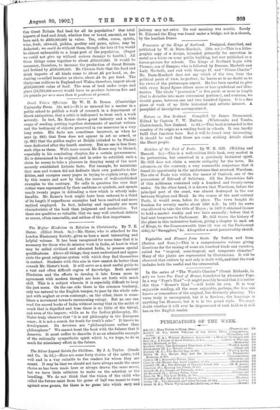Greek Votive Offerings. By W. H. D. Rouse. (Cambridge University
Press. 155. net.)—It is so unusual for a master in a public school to publish. a work of research in a department of Greek antiquities, that a critic is indisposed to treat such a work severely. In fact, Mr. Rouse shows great industry and a wide range of reading, putting together statements of ancient writers and the testimony of objects preserved in our museums in a very long series. His facts are sometimes incorrect, as when he says (p. 883) that Zeus does not appear in art as armed, or (p. 381) that the golden eagles at Delphi (alluded to by Pinder) were dedicated after the fourth century. But no one is free from such slips as these. With more reason Mr. Rouse may be blamed, especially in his concluding chapter, for a certain perverseness. He is determined to be original, and in order to establish such a claim he seems to take a pleasure in denying many of the most securely established historic facts. For example, ho maintains that men and women did not dedicate their own portraits to the deities, and occupies many pages in trying to explain away, now by this means and now by that, the scores of well-established examples to the contrary. He calls in question the view that deities were represented by their emblems or symbols, and spends nearly twenty pages in defending a view which is utterly inde- fensible. Mr. Rouse's book might have been reduced to a third of its length if superfluous examples had been omitted and more method employed. In fact, industry and ingenuity are more characteristic of the book than judgment and moderation. Yet these are qualities so valuable that we may well overlook defects or errors, often removable, and seldom of the first importance.






































 Previous page
Previous page